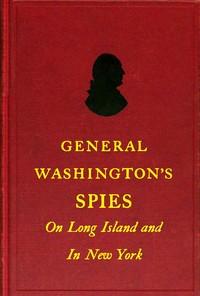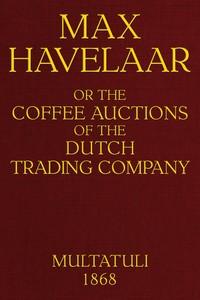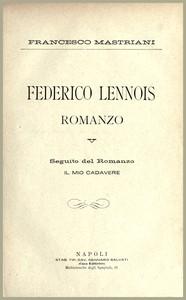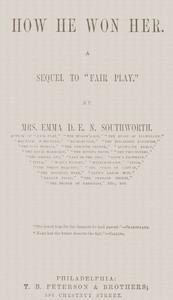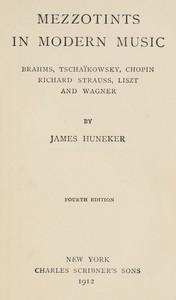|
|
Read this ebook for free! No credit card needed, absolutely nothing to pay.Words: 137366 in 39 pages
This is an ebook sharing website. You can read the uploaded ebooks for free here. No credit cards needed, nothing to pay. If you want to own a digital copy of the ebook, or want to read offline with your favorite ebook-reader, then you can choose to buy and download the ebook.

: General Washington's spies on Long Island and in New York by Pennypacker Morton - New York (N.Y.) History Revolution 1775-1783; Washington George 1732-1799 Career in espionage; Spies New York (State) History 18th century; Espionage New York (State) History@FreeBooksThu 08 Jun, 2023 r. material as to be remarkable. The wife of Joseph Lawrence was Phebe and there were not so many that knew her maiden name, but it was Townsend and she was the daughter of the Fourth Henry Townsend. They were married in 1764 when he was 23. Their son Effingham married Anne Townsend daughter of Solomon Townsend who was Robert Townsend's brother. A daughter of Anne and Effingham twenty three years after her mother's death had occasion to go through the homestead and there under the eaves in the garret at the stone house she found this interesting correspondence that had evidently been placed there by her grandparents and had remained unobserved for nearly a century. It reached the Long Island Collection in East Hampton a few months ago, having been carefully preserved but without critical examination during the past seventy years. John Bolton was the assumed name of the man who stood between the Culpers and General Washington. With the occasional exception of a letter to General Washington all from the Culpers were addressed to Mr. John Bolton, the name assumed by Major Benjamin Tallmadge in the secret service work. Major Tallmadge did not try to conceal his identity after the war. Caleb Brewster always permitted his own name to be used. With his trusty gun and sword he defended it, although the British at one time offered a large reward for his capture. Austin Roe, also of Setauket, was the chief messenger. He was given no other name, but was known by a number, which was 724. Jonas Hawkins was another messenger, and there were several more that could be depended upon if required, but Austin Roe became so expert in the service as to eclipse the rest. One who can realize what he had to contend with must view with amazement the work of Austin Roe. Across the Sound General Washington had Dragoons posted, three every fifteen miles apart, to carry the messages to him, whilst on the Long Island side Austin Roe rode the fifty-five miles from Setauket to New York and the same distance back, through the enemy's country, unattended. True, officers in British uniforms had permitted him to arrange for relays of horses which he could exchange along the way as required, but nevertheless it was a remarkable feat and should yet be recognised as such. Had it been possible to follow a message from New York to Headquarters in 1781 one might have seen Austin Roe enter a coffee house in the vicinity of Wall Street. Visibly tired, and probably hungry as well, for he had just finished a long ride. Few were in the room at that hour but in the far corner we will observe two British officers in conversation with a gentleman dressed in the fashion of the day. This is Mr. Townsend, and the officers are persuading him to visit their encampment. They have been advised that he is diffident but they have discovered that preferment comes to those who receive favorable publicity in the English Magazines as well as in the Royal Gazette. Mr. Rivington, the king's printer, had advised them to cultivate Mr. Townsend's acquaintance; to keep him posted as to all their activities if they value publicity such as he may give them; and they exact from Townsend the promise of an early visit. They do not know that the Coffee Room was established for that very purpose: that Townsend and Rivington although silent partners were its financial backers; and that Rivington wished to establish it in order to provide a place close by his printing office where British officers would meet and furnish him with copy for the English Magazines and his own Royal Gazette. Townsend he found apt, and most willing to run down news that made good copy; and the fact that Townsend refused to be on his pay roll or to accept money for his work did not lessen Rivington's regard for him. That James Rivington ever imagined Robert Townsend to be in the service of General Washington there is no evidence to show. In fact it is very unlikely. Rivington was not the type of man that Townsend would trust with that secret. The sight of Roe was sufficient to apprise Townsend that the General was expecting a message. When he could excuse himself he left the Coffee Shop and returned to his own rooms, which were nearby. He was soon followed by Austin Roe, who handed him a letter from Mr. John Bolton. This read: "I wish you to send by bearer 1/2 ream letter paper, same as the last. Mr. Roe will pay for it." Townsend paid little attention to this message, but opening a secret closet brought out a vial of liquid which he proceeded to brush over the letter. Soon another message appeared on the same sheet of paper. It was from General Washington requesting certain important information. Meanwhile Roe had started down the street for the printing office of James Rivington at the corner of Queen Street facing the North Front of the Coffee House. Here he purchased a half ream of paper--had it carefully wrapped and labeled and then started back with it to Townsend's rooms. Very carefully it was unwrapped, in order that it could be sealed again without showing that it had been opened. Townsend then began counting the sheets until he arrived at a number previously agreed upon. That sheet was then extracted, and reaching for a vial of a different liquid he proceeded to write. But only momentarily could the words be seen. As soon as the stain was dry it disappeared, leaving no hint that it was there waiting to be developed by the other liquid. The supper hour was now approaching when the Coffee Room would be a scene of great gaiety. There would be gathered new arrivals from abroad, anxious for an introduction, and those expecting soon to leave would be tendered an affectionate adieu. It was a huge success from the standpoint of a news gatherer, and would have been worth while even if it had not been returning the handsome revenue it did at that time. So thought Rivington. Doubtless Townsend from the standpoint of a Spy thought the same, but unlike Rivington he kept his own counsel. It should not be presumed that all could be gotten in this fashion. There were reports from at least a dozen to be checked over, and out of the way places to be visited. When all had been summed up Townsend finished his letter and returned it to its proper place in the package of letter paper. Austin Roe packed his saddle bags with a variety of articles needed by those at the east end of the Island, and carefully stowed among the things was this half ream of paper for Mr. John Bolton. In the late forenoon he set off, crossing the Brooklyn ferry and from there heading either for Jamaica or Flushing he soon was well on his way. There were times when he met with trouble along the road but upon this occasion we presume that he reached Setauket without incident, and just in time to give attention to his cattle, which were kept pastured in a field belonging to Abraham Woodhull. It might have been a matter of suspicion had he always left a package with Woodhull, therefore a box in the field was resorted to on this as upon many occasions, and straightway home Roe drove the cows. Later Woodhull, passing through the field, transferred the contents of the box to a bag he was carrying and soon the intelligence for General Washington was in his private room. Other messages to accompany those just arrived were now prepared by Woodhull, who we will not forget always signed himself Culper Senior in this correspondence. Caleb Brewster was waiting with his boats to convey these messages across the Sound. Woodhull knew he was waiting but had not seen him. He had observed the black petticoat which was the signal of his arrival hanging on the line across the creek on Strong's Neck. He knew where the boats were hid, too, although there were six landing places, but he had observed hanging with the clothes on the line near half a mile away four handkerchiefs. Just as one, two, three, five or six hanging there at one time indicated certain landing places Woodhull knew that four indicated the Neck, and there when the messages were ready he took them. It was long a question as to who it was that used this clothes line signal to guide the delivery of the messages to Brewster who was to carry them across the sound on their way to Washington's headquarters. Finally a clue was found among the papers of the Floyd family and when this was compared with the Woodhull account book it was discovered that the signals were arranged by no less a personage than the wife of Judge Selah Strong. Anna Smith was her maiden name. She was born on April 14th, 1740, and married Judge Strong on Nov. 9th, 1760. Brewster sometimes would capture an enemy crew on the way across, and sometimes when not well protected they would chase him. Occasionally he found it necessary to kill some of them. Major Tallmadge was not always to be found in the same place but kept Brewster sufficiently informed to be able to steer in the right direction. When to Major Tallmadge the messages were handed they were again examined, in fact frequently the stain letters were developed and then forwarded to the nearest Dragoons posted along the road, from whence they were relayed to Headquarters. No one will challenge the emphasis put upon the importance of the Secret Service. Only lack of details has deterred its recognition. As early as April 1779, Major Tallmadge began by saying: "Some pieces of useful intelligence respecting the movements of the Enemy in this late intended Expedition to New London, and which I have reason to believe in a great measure defeated their intentions, have been communicated by Culper." "Of very great importance" Washington considered it, and so wrote on July 11, 1780 "I rely upon this intelligence," he wrote at another time. When G. W. P. Custis, adopted son of General Washington, was told by friends, who probably over-estimated, that the service had cost between one thousand and fifteen hundred pounds, he wrote: "It was a cheap, a dog cheap bargain; for, although gold was precious in the days of the Continental currency, yet the gold paid for the secret service was of inestimable value, when it is remembered how much it contributed to the safety and success of the army of Independence." Too much can not be said of the personnel of the service, due largely to Robert Townsend, whom all the others speak of in the highest terms. "Nothing could induce me to be here but the earnest desire of Culper Jur.," said Woodhull in 1779. "He is the person in whom I have the greatest confidence," General Washington wrote of Culper Junior in a letter to Congress. "This much I can assure you," says Major Tallmadge, "he is a Gentleman of business, of Education and honor." Of him on June 20th, 1779, Woodhull wrote: "He is a person that hath the interest of our Country at heart and of good reputation, character and family, I have reason to think his advantages for serving you, and abilities, are far superior to mine. As long as I am here shall be an assistant and do all that I can." Again on February 5th, 1780, General Washington wrote of Culper Junior: "His accounts are intelligent, clear, and satisfactory ... I rely upon his intelligence," and Woodhull echoes "He's allowed to be a person of good sense and judgment, and his firmness and friendship towards our Country I do assure, you need not doubt. I have known him several years and confident he is a sincere friend, and hath undertaken it solely for to be some advantage to our distressed Country." Then in May, 1781, General Washington recorded: "Of the Culpers fidelity and ability I entertain the highest opinion." In this volume are now collected a majority of the letters still in existence from spies in the American service during the Revolutionary War. That General Washington was contented with an occasional report from other scenes of action evinces the importance he attached to the territory around New York. That the Spies of Washington are worthy of important recognition in the annals of the State becomes evident as their work is examined. G. M. Pierce, Registrar General of the National Society, D. A. R. in 1918 summed up the Revolutionary Spy in these words: "The man or woman who enters upon such a career must possess strength of character and be endowed with all the qualifications of a good soldier and a commanding officer besides. A soldier must possess bravery and courage, but a spy must be not only brave and courageous, but must also have what is called 'nerve,' poise, self possession, absolute control of facial expression, fearlessness, tact and discretion unequalled. For his is the most hazardous of all undertakings. Discovery means death, the penalty inflicted alike by all nations." FOOTNOTES to "FOREWORD": Free books android app tbrJar TBR JAR Read Free books online gutenberg More posts by @FreeBooks
: Max Havelaar; by Multatuli Nahuys Alphonse Translator - Culture conflict Fiction; Colonies Oceania Fiction; Dutch Indonesia Fiction; Java (Indonesia) Fiction; Persona (Literature); Coffee industry Fiction@FreeBooksThu 08 Jun, 2023

: How he won her by Southworth Emma Dorothy Eliza Nevitte - American fiction 19th century@FreeBooksThu 08 Jun, 2023
|
Terms of Use Stock Market News! © gutenberg.org.in2025 All Rights reserved.

